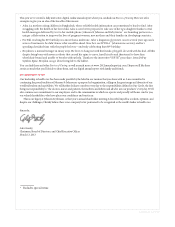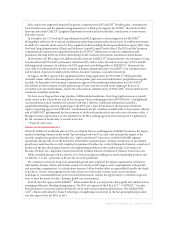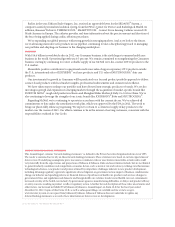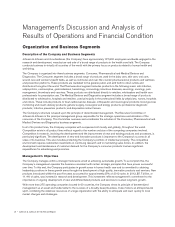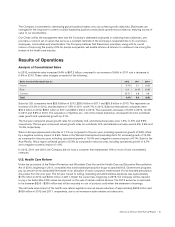Johnson and Johnson 2012 Annual Report Download - page 14
Download and view the complete annual report
Please find page 14 of the 2012 Johnson and Johnson annual report below. You can navigate through the pages in the report by either clicking on the pages listed below, or by using the keyword search tool below to find specific information within the annual report.Neuroscience products sales were $6.7 billion, a decline of 3.3% as compared to the prior year. Growth was impacted by
generic competition for CONCERTA®/methylphenidate, RAZADYNE®(galantamine), RISPERDAL®(risperidone) and
DURAGESIC®/Fentanyl Transdermal (fentanyl transdermal system). A decline in the Company’s long-acting injectable
antipsychotic, RISPERDAL®CONSTA®(risperidone), was offset by strong sales of INVEGA®SUSTENNA®/XEPLION®
(paliperidone palmitate) and INVEGA®(paliperidone palmitate). The Company’s U.S. Supply and Distribution Agreement
with Watson Laboratories, Inc. to distribute an authorized generic version of CONCERTA®became effective May 1, 2011.
The original CONCERTA®patent expired in 2004, and the parties have received approval from the FDA to manufacture
and market a generic version of CONCERTA®. Another generic version of CONCERTA®was launched on December 31,
2012. This will result in a further reduction in CONCERTA®sales.
Oncology products achieved sales of $2.6 billion in 2012, representing an increase of 28.4% as compared to the prior
year. This growth was primarily due to sales of ZYTIGA®(abiraterone acetate) and VELCADE®(bortezomib). This growth
was partially offset by lower sales of DOXIL®(doxorubicin HCI liposome injection)/CAELYX®(pegylated liposomal
doxorubicin hydrochloride), due to supply constraints from the Company’s third-party manufacturer. The Company has
been working to restore a reliable supply of DOXIL®/CAELYX®. Full access in the U.S. has been restored. An alternate
manufacturing approach was approved in the European Union (EU) and Japan late in 2012 and in Canada in January of
2013. In the European Union, the CAELYX®managed access program was put in place to ensure patients can complete
their full course of treatment. It will remain in place until a full supply of CAELYX®has been restored. In February 2013, the
FDA approved a generic version of DOXIL®.
Other Pharmaceutical sales were $4.9 billion, a decline of 8.3% as compared to the prior year primarily due to divestitures
and lower sales of ACIPHEX®/PARIET®(rabeprazole sodium) and EPREX®(Epoetin alfa), primarily due to the impact of
generic competition. These results were partially offset by sales growth of XARELTO®(rivaroxaban).
During 2012, the Company received several regulatory approvals including: U.S. approval of a new 800mg tablet of
PREZISTA®(darunavir) for once-daily oral administration for the treatment of human immunodeficiency virus (HIV-1) in
treatment-naive and treatment-experienced adult patients with no darunavir resistance-associated mutations; FDA
approval for the expanded use of XARELTO®(rivaroxaban) to treat deep-vein thrombosis, or DVT, and pulmonary
embolism, or PE and to reduce the risk of recurrent DVT and PE following initial treatment; and the FDA granted
accelerated approval for SIRTURO™ (bedaquiline) tablets for the treatment of pulmonary multi-drug resistant tuberculosis
as part of combination therapy in adults. The FDA approved the supplemental New Drug Application (NDA) for
NUCYNTA®ER (tapentadol) extended-release tablets, an oral analgesic taken twice daily, for the management of
neuropathic pain associated with diabetic peripheral neuropathy in adults. The FDA and the European Commission also
approved an expanded indication for ZYTIGA®(abiraterone acetate), in combination with prednisone, allowing for the use
before chemotherapy in the treatment of metastatic castration-resistant prostate cancer. In addition, the European
Commission approved the marketing authorizations for DACOGEN®(decitabine) for the treatment of adult patients (age
65 years and above) with newly diagnosed de novo or secondary acute myeloid leukemia who are not candidates for
standard induction chemotherapy, and for the subcutaneous administration of VELCADE®(bortezomib) for the treatment
of multiple myeloma.
The Company submitted several New Drug Applications, including an NDA to the FDA and Marketing Authorization
Application (MAA) to the European Medicines Agency (EMA) seeking approval for the use of canagliflozin, an oral, once-
daily, selective sodium glucose co-transporter 2 (SGLT2) inhibitor, for the treatment of adult patients with type 2 diabetes,
and an NDA seeking approval for a fixed-dose therapy combining canagliflozin and immediate release metformin to treat
patients with type 2 diabetes. Additional submissions included a supplemental Biologics License Application to the FDA
and a Type II Variation to the EMA requesting approval of STELARA®(ustekinumab) for the treatment of adult patients
with active psoriatic arthritis, and a Biologics License Application to the FDA requesting approval of an investigational
intravenous formulation of the anti-tumor necrosis factor (TNF)-alpha SIMPONI®(golimumab) for the treatment of adults
with moderately to severely active rheumatoid arthritis. In addition, a supplemental Biologics License Application was
submitted to the FDA and a Type II Variation was submitted to the EMA requesting approval of SIMPONI®(golimumab) for
the treatment of moderately to severely active ulcerative colitis in adult patients who have had an inadequate response to
conventional therapy including corticosteroids and 6-mercaptopurine (6-MP) or azathioprine (AZA), or who are intolerant
to or have medical contraindications for such therapies. Finally, an MAA was submitted to the EMA seeking conditional
approval for the use of bedaquiline (TMC207) as an oral treatment, to be used as part of combination therapy for
pulmonary, multi-drug resistant tuberculosis in adults.
Pharmaceutical segment sales in 2011 were $24.4 billion, an increase of 8.8% from 2010, with operational growth of
6.2% and a positive currency impact of 2.6%. U.S. sales were $12.4 billion, a decrease of 1.1%. International sales were
$12.0 billion, an increase of 21.3%, which included 15.5% operational growth and a positive currency impact of 5.8%.
6•Johnson & Johnson 2012 Annual Report



